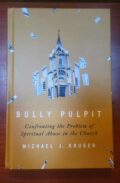 Bully Pulpit:
Bully Pulpit:
Confronting the Problem of Spiritual Abuse in the Church
By Michael J. Kruger
Is “spiritual abuse” real or some modern form of victim mentality?
Michael J. Kruger answers this question with the scholarly biblical precision that you would expect from the president of Reformed Theological Seminary in Charlotte, NC, where he is also a professor of New Testament and Early Christianity. His scholarly focus has been on the New Testament Canon.
TGC Award-winner
Bully Pulpit will be particularly helpful to people who are trying to understand spiritual abuse and who identify strongly with the theological perspective of The Gospel Coalition. It was chosen by TGC as the 2022 Book of the Year under the category of Ministry.
An excellent combination of careful Biblical scholarship and practical application:
Kruger takes a measured and scholarly approach in examining examples of spiritual abuse in the Old and New Testaments; qualifications of faithful leaders vs. characteristics of abusive leaders; and false beliefs that appear “biblical” but are actually distortions that provide the soil in which abuse can flourish. Alongside his biblical exegesis, he continually provides real life examples and practical applications of biblical principles.
He ably describes leadership cultures that are primed to allow abuse to take root and grow unchecked. But Kruger does not leave the reader only with the ability to diagnose the problem. He also gives practical steps that can nourish a leadership structure and culture that can prevent abuse and act decisively to guard the flock if a wolf arises among the leaders. A godly and effective leadership culture will value “character over competence,” “ teamwork over hierarchy,” and “accountability over secrecy.”
Kruger is specific enough that a reader who is in a church or Christian organization will be able any recognize the warning signs in their own situation and know what can be done to change the culture to increase its resistance to abuse.
Although Kruger is careful to acknowledge the reality of the devastation that occurs in people who have been the targets of spiritual abuse in their Christian community, the book could be stronger in identifying practical ways the church can care for people who are the victims of abuse. He does address this, but primarily in terms of church structures and procedures, rather than spiritual care and support for those harmed.
Helpful quotes:
“Spiritual abuse is when a spiritual leader—such as a pastor, elder, or head of a Christian organization—wields his position of Christian authority in such a way that he manipulates, domineers, bullies, and intimidates those under him as a means of maintaining his own power and control, even if he is convinced he is seeking biblical and kingdom-related goals.” (p 24)
“We are not talking about just emotional and psychological abuse, although there is considerable overlap….the term spiritual abuse rightly highlights the core reason this abuse is so devastating to Christians—namely that it was perpetrated by the very pastor (or elder board) that was supposed to protect them. It is that dynamic that then leads to the disillusionment and distrust of church , and perhaps Christianity as a whole. “ (p. 22-23)
Bully Pulpit on Amazon (This is not an affiliate link. It’s provided for your convenience.)